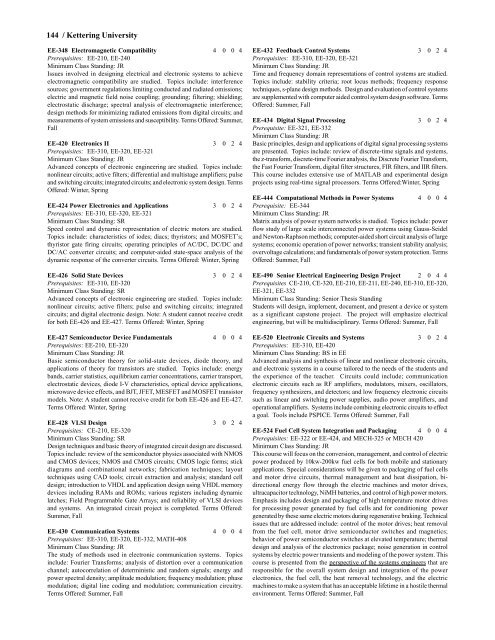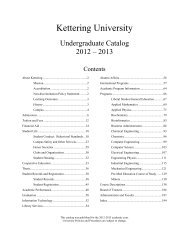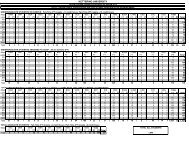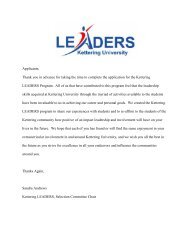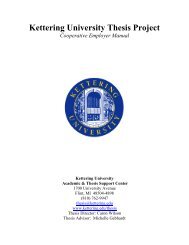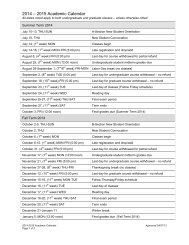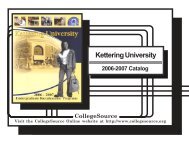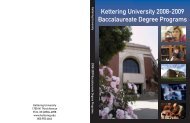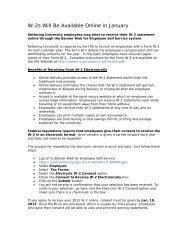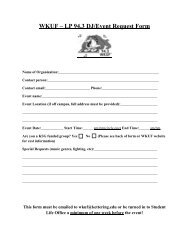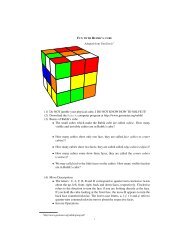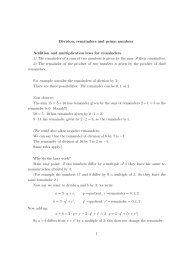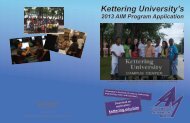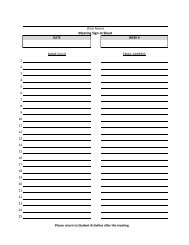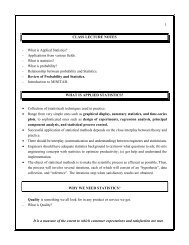2007-2008 Undergraduate Catalog - Kettering University
2007-2008 Undergraduate Catalog - Kettering University
2007-2008 Undergraduate Catalog - Kettering University
You also want an ePaper? Increase the reach of your titles
YUMPU automatically turns print PDFs into web optimized ePapers that Google loves.
144 / <strong>Kettering</strong> <strong>University</strong><br />
EE-348 Electromagnetic Compatibility 4 0 0 4<br />
Prerequisites: EE-210, EE-240<br />
Minimum Class Standing: JR<br />
Issues involved in designing electrical and electronic systems to achieve<br />
electromagnetic compatibility are studied. Topics include: interference<br />
sources; government regulations limiting conducted and radiated omissions;<br />
electric and magnetic field noise coupling; grounding; filtering; shielding;<br />
electrostatic discharge; spectral analysis of electromagnetic interference;<br />
design methods for minimizing radiated emissions from digital circuits; and<br />
measurements of system emissions and susceptibility. Terms Offered: Summer,<br />
Fall<br />
EE-420 Electronics II 3 0 2 4<br />
Prerequisites: EE-310, EE-320, EE-321<br />
Minimum Class Standing: JR<br />
Advanced concepts of electronic engineering are studied. Topics include:<br />
nonlinear circuits; active filters; differential and multistage amplifiers; pulse<br />
and switching circuits; integrated circuits; and electronic system design. Terms<br />
Offered: Winter, Spring<br />
EE-424 Power Electronics and Applications 3 0 2 4<br />
Prerequisites: EE-310, EE-320, EE-321<br />
Minimum Class Standing: SR<br />
Speed control and dynamic representation of electric motors are studied.<br />
Topics include: characteristics of iodes; diacs; thyristors; and MOSFET’s;<br />
thyristor gate firing circuits; operating principles of AC/DC, DC/DC and<br />
DC/AC converter circuits; and computer-aided state-space analysis of the<br />
dynamic response of the converter circuits. Terms Offered: Winter, Spring<br />
EE-426 Solid State Devices 3 0 2 4<br />
Prerequisites: EE-310, EE-320<br />
Minimum Class Standing: SR<br />
Advanced concepts of electronic engineering are studied. Topics include:<br />
nonlinear circuits; active filters; pulse and switching circuits; integrated<br />
circuits; and digital electronic design. Note: A student cannot receive credit<br />
for both EE-426 and EE-427. Terms Offered: Winter, Spring<br />
EE-427 Semiconductor Device Fundamentals 4 0 0 4<br />
Prerequisites: EE-210, EE-320<br />
Minimum Class Standing: JR<br />
Basic semiconductor theory for solid-state devices, diode theory, and<br />
applications of theory for transistors are studied. Topics include: energy<br />
bands, carrier statistics, equilibrium carrier concentrations, carrier transport,<br />
electrostatic devices, diode I-V characteristics, optical device applications,<br />
microwave device effects, and BJT, JFET, MESFET and MOSFET transistor<br />
models. Note: A student cannot receive credit for both EE-426 and EE-427.<br />
Terms Offered: Winter, Spring<br />
EE-428 VLSI Design 3 0 2 4<br />
Prerequisites: CE-210, EE-320<br />
Minimum Class Standing: SR<br />
Design techniques and basic theory of integrated circuit design are discussed.<br />
Topics include: review of the semiconductor physics associated with NMOS<br />
and CMOS devices; NMOS and CMOS circuits; CMOS logic forms; stick<br />
diagrams and combinational networks; fabrication techniques; layout<br />
techniques using CAD tools; circuit extraction and analysis; standard cell<br />
design; introduction to VHDL and application design using VHDL memory<br />
devices including RAMs and ROMs; various registers including dynamic<br />
latches; Field Programmable Gate Arrays; and reliability of VLSI devices<br />
and systems. An integrated circuit project is completed. Terms Offered:<br />
Summer, Fall<br />
EE-430 Communication Systems 4 0 0 4<br />
Prerequisites: EE-310, EE-320, EE-332, MATH-408<br />
Minimum Class Standing: JR<br />
The study of methods used in electronic communication systems. Topics<br />
include: Fourier Transforms; analysis of distortion over a communication<br />
channel; autocorrelation of deterministic and random signals; energy and<br />
power spectral density; amplitude modulation; frequency modulation; phase<br />
modulation; digital line coding and modulation; communication circuitry.<br />
Terms Offered: Summer, Fall<br />
EE-432 Feedback Control Systems 3 0 2 4<br />
Prerequisites: EE-310, EE-320, EE-321<br />
Minimum Class Standing: JR<br />
Time and frequency domain representations of control systems are studied.<br />
Topics include: stability criteria; root locus methods; frequency response<br />
techniques, s-plane design methods. Design and evaluation of control systems<br />
are supplemented with computer aided control system design software. Terms<br />
Offered: Summer, Fall<br />
EE-434 Digital Signal Processing 3 0 2 4<br />
Prerequisite: EE-321, EE-332<br />
Minimum Class Standing: JR<br />
Basic principles, design and applications of digital signal processing systems<br />
are presented. Topics include: review of discrete-time signals and systems,<br />
the z-transform, discrete-time Fourier analysis, the Discrete Fourier Transform,<br />
the Fast Fourier Transform, digital filter structures, FIR filters, and IIR filters.<br />
This course includes extensive use of MATLAB and experimental design<br />
projects using real-time signal processors. Terms Offered:Winter, Spring<br />
EE-444 Computational Methods in Power Systems 4 0 0 4<br />
Prerequisite: EE-344<br />
Minimum Class Standing: JR<br />
Matrix analysis of power system networks is studied. Topics include: power<br />
flow study of large scale interconnected power systems using Gauss-Seidel<br />
and Newton-Raphson methods; computer-aided short circuit analysis of large<br />
systems; economic operation of power networks; transient stability analysis;<br />
overvoltage calculations; and fundamentals of power system protection. Terms<br />
Offered: Summer, Fall<br />
EE-490 Senior Electrical Engineering Design Project 2 0 4 4<br />
Prerequisites CE-210, CE-320, EE-210, EE-211, EE-240, EE-310, EE-320,<br />
EE-321, EE-332<br />
Minimum Class Standing: Senior Thesis Standing<br />
Students will design, implement, document, and present a device or system<br />
as a significant capstone project. The project will emphasize electrical<br />
engineering, but will be multidisciplinary. Terms Offered: Summer, Fall<br />
EE-520 Electronic Circuits and Systems 3 0 2 4<br />
Prerequisites: EE-310, EE-420<br />
Minimum Class Standing: BS in EE<br />
Advanced analysis and synthesis of linear and nonlinear electronic circuits,<br />
and electronic systems in a course tailored to the needs of the students and<br />
the experience of the teacher. Circuits could include; communication<br />
electronic circuits such as RF amplifiers, modulators, mixers, oscillators,<br />
frequency synthesizers, and detectors; and low frequency electronic circuits<br />
such as linear and switching power supplies, audio power amplifiers, and<br />
operational amplifiers. Systems include combining electronic circuits to effect<br />
a goal. Tools include PSPICE. Terms Offered: Summer, Fall<br />
EE-524 Fuel Cell System Integration and Packaging 4 0 0 4<br />
Prerequisites: EE-322 or EE-424, and MECH-325 or MECH 420<br />
Minimum Class Standing: JR<br />
This course will focus on the conversion, management, and control of electric<br />
power produced by 10kw-200kw fuel cells for both mobile and stationary<br />
applications. Special considerations will be given to packaging of fuel cells<br />
and motor drive circuits, thermal management and heat dissipation, bidirectional<br />
energy flow through the electric machines and motor drives,<br />
ultracapacitor technology, NiMH batteries, and control of high power motors.<br />
Emphasis includes design and packaging of high temperature motor drives<br />
for processing power generated by fuel cells and for conditioning power<br />
generated by these same electric motors during regenerative braking. Technical<br />
issues that are addressed include: control of the motor drives; heat removal<br />
from the fuel cell, motor drive semiconductor switches and magnetics;<br />
behavior of power semiconductor switches at elevated temperature; thermal<br />
design and analysis of the electronics package; noise generation in control<br />
systems by electric power transients and modeling of the power system. This<br />
course is presented from the perspective of the systems engineers that are<br />
responsible for the overall system design and integration of the power<br />
electronics, the fuel cell, the heat removal technology, and the electric<br />
machines to make a system that has an acceptable lifetime in a hostile thermal<br />
environment. Terms Offered: Summer, Fall


